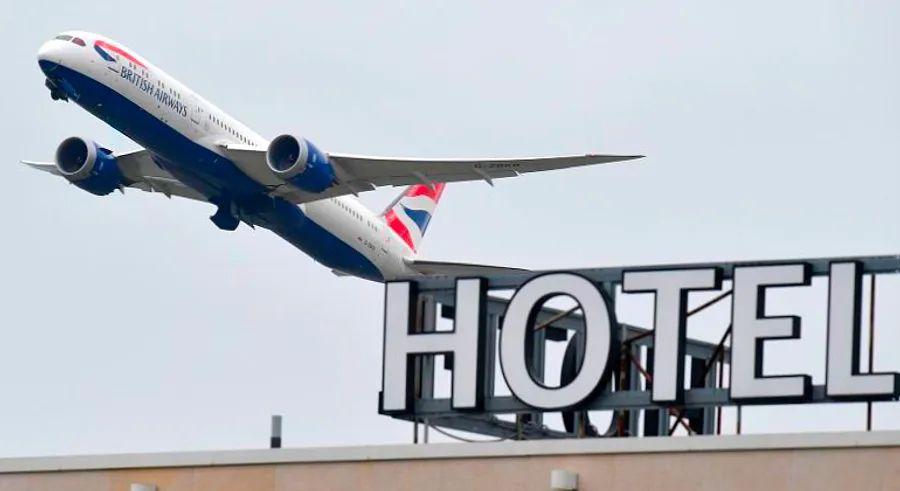UK enforces hotel quarantine for travelers from Covid hotspots

UK nationals returning from 30 'high-risk' countries must undergo a 10-day hotel quarantine at their own expense, as the UK strengthens border restrictions to combat one of the world’s worst Covid-19 outbreaks.
Prime Minister Boris Johnson announced that the stricter rules will apply to travelers from 'red list' nations, where there are significant concerns over new Covid variants.
Non-UK citizens will be denied entry, while British nationals and permanent residents will be transported directly from the airport to government-arranged accommodations to begin their mandatory isolation.
This announcement coincided with the UK reaching the tragic milestone of 100,000 Covid-19 deaths, becoming the first European country to do so.
Johnson also stated that travelers will be questioned about the purpose of their journey. 'I want to make it clear that under stay-at-home rules, it is illegal to travel abroad for leisure, and we will enforce this at airports and ports by asking individuals for their reason for traveling. If they cannot provide a valid reason, they will be instructed to return home,' he said.
UK Home Secretary Priti Patel later revealed that anyone wishing to leave the UK must first submit a declaration proving that their trip is essential.
This follows the January 18 announcement that all travelers entering the UK, including British citizens, must provide a negative Covid test taken within 72 hours of arrival. Before this, the borders had been open with no testing requirements.
The UK Department for Transport’s list mostly targets countries where the South African and Brazilian Covid variants are believed to be spreading, as well as countries with strong travel connections to those regions. However, some notable exceptions are included.
The United States, France, and Israel are not on the banned list, despite the presence of the South African or Brazilian variants of Covid-19 in those countries.
Portugal is the only European nation on the UK’s banned list, added due to its significant travel connections with Brazil, according to British Transport Secretary Grant Shapps earlier this month.
However, the European Centre for Disease Prevention and Control, along with the WHO, have raised concerns about the presence of Covid-19 variants in other European nations.
The travel ban also affects countries without direct flights to the UK, such as Venezuela, Seychelles, and the Democratic Republic of Congo. The ban extends to anyone who has transited through any of the banned nations in the past 10 days, impacting travelers with connecting flights or those arriving via a third country.

UK residents have been under stay-at-home orders since January 4, and many citizens returned to the UK on repatriation flights earlier in the pandemic. Therefore, it seems unlikely that a significant number of UK citizens and residents are currently trying to return home.
The new policy may take several weeks to implement as the required facilities are still being prepared. Johnson stated, 'The Department of Health and Social Care is working to set up these facilities as quickly as possible.'
The policy faced criticism from Nick Thomas-Symonds, a senior member of the opposition Labour party, who described the announcement as 'too little too late' and called for 'comprehensive hotel quarantining.'
Thomas-Symonds has also urged the government to introduce a support package for the aviation sector.
Heathrow Airport, the UK’s busiest airport, expressed full support for measures that protect public health but emphasized the need for additional financial aid for the industry.
Heathrow emphasized the crucial role aviation will play in achieving the Government’s Global Britain goals, leveling-up, and supporting a green recovery. However, this is only possible if the sector survives. The airport calls for 100% business rates relief, an extension of the furlough scheme, and a clear roadmap for safely reopening borders.
Gloria Guevara, the president and CEO of the World Travel & Tourism Council (WTTC), issued a response to the UK government's latest travel proposal in a statement.
'We firmly believe that testing both at departure and arrival is the only effective measure to stop the virus spread while allowing travelers with negative tests to move safely and restore international mobility,' Guevara said.
'The government must be transparent about the criteria used to designate countries as 'high risk,' and it's essential to have a clear exit strategy along with more specifics regarding its arrival testing policy,' she added.

1

2

3

4

5
Evaluation :
5/5